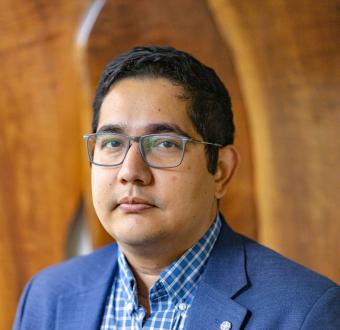Dr. Ehsan Karim
Assistant Professor, University of British Columbia
Dr. Ehsan Karim, Assistant Professor, University of British Columbia
Dr. M. Ehsan Karim is an Assistant Professor in Health Data Science at the University of British Columbia's School of Population and Public Health (SPPH) and a Scientist at the Centre for Health Evaluation and Outcome Sciences (CHÉOS). He is also a Michael Smith Foundation for Health Research (MSFHR) Scholar and an Associate Member of UBC Statistics, with a focus on developing data science methods for large administrative healthcare and big data analysis, specifically in the area of multiple sclerosis (MS).
Dr. Karim is a biostatistician who received his Ph.D. in Statistics from UBC and completed a postdoctoral fellowship in Epidemiology and Biostatistics at McGill University. During his doctoral studies, he was awarded research studentships from MS Canada (2012- 2015). Dr. Karim's \ research has made significant contributions in several areas, including resolving healthcare controversies using statistics, effectively integrating machine learning techniques in real-world data, and identifying deficiencies in current methodological approaches used in healthcare research. Dr. Karim has a long history of collaboration on various MS-related topics with Professor Tremlett, resulting in multiple first-authored high-impact epidemiology and statistical publications, as well as collaborative publications in high-impact medical journals. Many of his works have been cited favorably by various methodological and MS-related guideline and review articles.
Learn more about Dr. Karim
What is the focus of your research? How did you become interested in MS research?
My research is focused on developing and applying data science methods to analyze largescale administrative healthcare databases. My work aims to generate evidence that can guide treatment decisions and healthcare policy, and address clinical issues. I became interested in MS research during my doctoral studies at the University of British Columbia, where I was awarded research studentships from MS Canada (2012-2015). This experience allowed me to develop statistical methods for analyzing data related to MS, which led to several publications in high-impact journals. However, what truly drives my research is the possibility of helping people with MS in real-world scenarios outside of clinical trial settings. I am passionate about developing disease-specific comorbidity indices that can better account for the complex relationships between healthcare factors and improve patient outcomes, particularly for those with MS.
What inspires you to continue advancing research in this field?
What inspires me is the potential impact my research can have on improving healthcare outcomes and policy. I believe that developing accurate and effective methods for analyzing large-scale administrative healthcare databases can provide valuable insights into clinical issues and guide treatment decisions. As a biostatistician, I am driven by the challenge of developing innovative methods to address complex healthcare problems. My interest in MS research is also motivated by the opportunity to make a meaningful difference in the lives of those affected by this disease.
How do you hope to change the lives of people living with MS through your research?
As a researcher, my ultimate goal is to make a significant and positive impact on the lives of people living with MS. I believe that my research on comorbidities associated with MS has the potential to improve the lives of people with MS. Comorbidities are common in MS and can have a significant impact on a patient's health outcomes, including their quality of life. By developing disease-specific comorbidity indices that better account for the complex relationships between healthcare factors and improve patient outcomes, I hope to provide clinicians with valuable information to guide treatment decisions and improve the overall health of people with MS. Additionally, my research has the potential to identify new and more effective treatments for MS, and improve the accuracy of predicting disease progression and treatment outcomes. By leveraging the power of big data and advanced statistical methods, I hope to generate evidence that can inform healthcare policies and ultimately improve the lives of people with MS and their families.
What do you enjoy most about your research? What are some of the challenges you face?
What I enjoy most about my research is developing statistical methods that can solve important healthcare problems. It's satisfying to see my research have a real-world impact and improve patient outcomes. However, there are challenges that come with this work, such as dealing with complex and large datasets, navigating the funding and grant application process, and keeping up with new statistical methods and technologies. Additionally, designing studies that can account for the wide range of symptoms and experiences that people with MS may face can also be a challenge. Despite these challenges, I am driven to continue my work and make a positive impact in the field of healthcare research.
How important is the support from MS Canada in your research?
The support from MS Canada (MSC) is critical in enabling me to conduct the necessary research, collect data, and develop and validate the MS outcome-specific Comorbidity Summary Index (MSCI). My current research focuses on developing a disease-specific comorbidity index for MS using health administrative databases, which is essential to understanding the impact of comorbidities on the health outcomes of people living with MS. Additionally, the support from MSC will enable me to train PhD researchers and prepare them for methodological MS research, thus contributing to the overall advancement of MS research beyond this one project.
